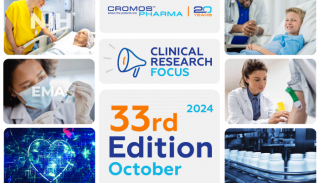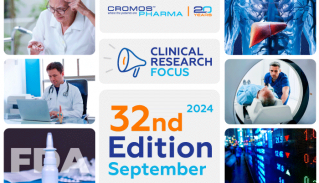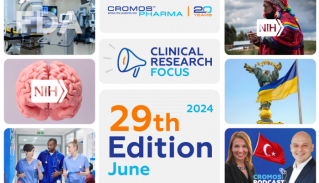
Clinical Research Focus. 7th Edition
Research Shows Investigational Drug Fosters Nerve Repair after Injury
Researchers from the University of Birmingham have shown that a drug currently used against cancer can accelerate nerve recovery after injuries. The candidate drug, known as AZD1390, can block the response to DNA damage in nerve cells and promote regeneration of damaged nerves. There is a hypothesis that The DNA Damage Response system, which is activated by DNA damage, can significantly impede the recovery process after a spinal cord injury. By blocking this system, nerve repair and restoration of function after injury can be improved. Compounds such as AZD1390, among others, can represent a potential therapeutic strategy to foster nerve repair. Read more about this study here.
Medical Writing Guidelines
 The dynamic field of medicine involves extensive research, which needs to be communicated to various stakeholders. One common way to achieve this objective is through medical writing.
The dynamic field of medicine involves extensive research, which needs to be communicated to various stakeholders. One common way to achieve this objective is through medical writing.
In this article you will be introduced to different facets of medical writing and their specific applications. Additionally, you will have a preview of medical writing services available for any of your needs.
Choosing The Right CRO For Your Clinical Trials
 It is absolutely certain that the CRO you chose for your clinical program will become your company’s most important ally. Depending on the sponsor’s internal capabilities, its partner CRO may be asked to perform virtually every aspect of a clinical trial. The duties of a CRO include, but are not limited to, patient recruitment, clinical research services, regulatory support, medical writing, biostatistics, data-management and pharmacovigilance. It is imperative that your company makes the correct considerations when choosing its partner.
It is absolutely certain that the CRO you chose for your clinical program will become your company’s most important ally. Depending on the sponsor’s internal capabilities, its partner CRO may be asked to perform virtually every aspect of a clinical trial. The duties of a CRO include, but are not limited to, patient recruitment, clinical research services, regulatory support, medical writing, biostatistics, data-management and pharmacovigilance. It is imperative that your company makes the correct considerations when choosing its partner.
There is no universal checklist that one can refer to choose an “ideal CRO”, but there are certain criteria that aim to help a Sponsor in the process of selecting the “right CRO”. Find out why Cromos Pharma is an appropriate fit for you by clicking here.
Novel Gene Therapy Could Reduce Bleeding Risk for Hemophilia Patients
 A new study from the University College London has shown that a single use of a gene therapy candidate, called FLT180a, can significantly reduce bleeding risk in patients with hemophilia B. Currently, people with hemophilia B need weekly injections of recombinant FIX to prevent excessive bleeding. The studies found that a one-time treatment with FLT180a led to sustained production of FIX protein from the liver in the majority of patients, eliminating the need for regular replacement therapy. After 26 weeks, five patients had normal levels of FIX protein, three had low but increased levels, and one patient treated at the highest dose had an abnormally high level. To learn more about this study, read the whole article here.
A new study from the University College London has shown that a single use of a gene therapy candidate, called FLT180a, can significantly reduce bleeding risk in patients with hemophilia B. Currently, people with hemophilia B need weekly injections of recombinant FIX to prevent excessive bleeding. The studies found that a one-time treatment with FLT180a led to sustained production of FIX protein from the liver in the majority of patients, eliminating the need for regular replacement therapy. After 26 weeks, five patients had normal levels of FIX protein, three had low but increased levels, and one patient treated at the highest dose had an abnormally high level. To learn more about this study, read the whole article here.
Making a Memory Positive or Negative
 Have you ever wondered why some moments in life are remembered with joy, while others evoke negative feelings? While conducting a new study, Salk Institute researchers discovered a molecule in the brain that is responsible for the negative or positive coloring of memories. The brain’s ability to link good or bad feelings with a memory is called “valence assignment.” During previous studies, it was discovered that the group of neurons in the brain’s basolateral amygdala (BLA), helps assign valence. The most recent study showed the importance of the signaling molecule, neurotensin, to these BLA neurons. Find out more information here.
Have you ever wondered why some moments in life are remembered with joy, while others evoke negative feelings? While conducting a new study, Salk Institute researchers discovered a molecule in the brain that is responsible for the negative or positive coloring of memories. The brain’s ability to link good or bad feelings with a memory is called “valence assignment.” During previous studies, it was discovered that the group of neurons in the brain’s basolateral amygdala (BLA), helps assign valence. The most recent study showed the importance of the signaling molecule, neurotensin, to these BLA neurons. Find out more information here.
Liquid Biopsy Detects Breast Cancer DNA in Just Five Hours
 Johns Hopkins Kimmel Cancer Center researchers developed a new automated liquid biopsy test for the detection of cancer DNA presence in the blood of patients with metastatic breast cancer, which works within five hours. “If we are able to show by this cartridge assay that we are indeed successful in predicting the course of treatment, we might be able to institute changes in the way we look at chemotherapy and the way we treat patients for metastatic breast cancer,” said Saraswati Sukumar, Ph.D., Professor of Oncology and Pathology at the Johns Hopkins University School of Medicine. The test accurately detected cancer 83% of the time, and ruled out cancer 92% of the time, for an overall diagnostic accuracy of 85%. Please read the article to find out more.
Johns Hopkins Kimmel Cancer Center researchers developed a new automated liquid biopsy test for the detection of cancer DNA presence in the blood of patients with metastatic breast cancer, which works within five hours. “If we are able to show by this cartridge assay that we are indeed successful in predicting the course of treatment, we might be able to institute changes in the way we look at chemotherapy and the way we treat patients for metastatic breast cancer,” said Saraswati Sukumar, Ph.D., Professor of Oncology and Pathology at the Johns Hopkins University School of Medicine. The test accurately detected cancer 83% of the time, and ruled out cancer 92% of the time, for an overall diagnostic accuracy of 85%. Please read the article to find out more.
Summer 2022 Haemophilia Trial Update
 The International Society on Thrombosis and Haemostasis (ISTH) Annual Congress 2022 was held from July 9-13th in London. Discussions at the Congress were focused on the latest developments in the field of hemophilia.
The International Society on Thrombosis and Haemostasis (ISTH) Annual Congress 2022 was held from July 9-13th in London. Discussions at the Congress were focused on the latest developments in the field of hemophilia.
A recent Novo Nordisk study found that the candidate drug, Concizumab, an anti-tissue factor pathway inhibitor (TFPI) antibody, demonstrated an 86 % reduction in treated bleeds. In the results of the Phase III HAVEN 6 study (Hemlibra), conducted by Roche, the bleed control was meaningfully improved. Approximately 66% of people with moderate or mild haemophilia A, without factor VIII inhibitors treated with Hemlibra, experienced zero treated bleeds at 55.6 weeks (median follow-up). Another candidate drug by Sanofi (Fitusiran), a small interference RNA (siRNA) therapeutic, was found to reduce bleeds by 61%.
Follow the link to learn about other studies that were discussed at the Congress.
Roche’s Combination Breast Cancer Treatment Delivers Positive Results
 The Phase III APHINITY study in HER2-positive early breast cancer patients by Roche, showed progressive results – a 28% reduction in the risk of recurrence or death. The two arms included pertuzumab, a humanized anti-HER2 monoclonal antibody, combined with Herceptin (trastuzumab) and chemotherapy, versus Herceptin, chemotherapy and placebo. The safety profile was consistent with previous studies. “HER2-positive breast cancers are more likely than other subtypes to recur following surgery, so targeted treatment is critical to provide the best chance for a cure,” – said Levi Garraway, Roche’s Chief Medical Officer and Head of Global Product Development. To find out more please follow the link.
The Phase III APHINITY study in HER2-positive early breast cancer patients by Roche, showed progressive results – a 28% reduction in the risk of recurrence or death. The two arms included pertuzumab, a humanized anti-HER2 monoclonal antibody, combined with Herceptin (trastuzumab) and chemotherapy, versus Herceptin, chemotherapy and placebo. The safety profile was consistent with previous studies. “HER2-positive breast cancers are more likely than other subtypes to recur following surgery, so targeted treatment is critical to provide the best chance for a cure,” – said Levi Garraway, Roche’s Chief Medical Officer and Head of Global Product Development. To find out more please follow the link.






























